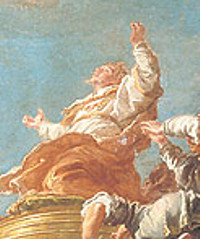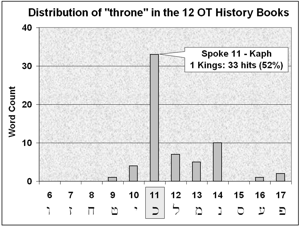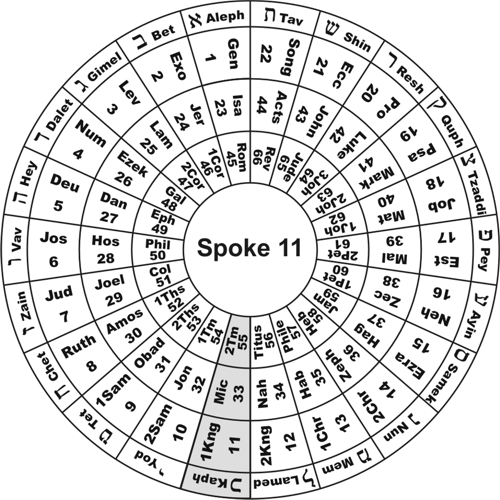The Throne of Glory
And Solomon stood before the altar of the LORD in the presence of all
the congregation of Israel, and spread forth his hands (kaph) toward heaven:
And he said, LORD God of Israel, there is no God like thee, in heaven above, or on earth beneath,
who keepest covenant and mercy with thy servants that walk before thee with all their heart.
1 Kings 8:22f (Spoke 11, Cycle 1)
 The name of the eleventh letter denotes
the palm or hollow of the hand.
The Lord established its name in one of His Alphabetic Verses: The name of the eleventh letter denotes
the palm or hollow of the hand.
The Lord established its name in one of His Alphabetic Verses:
- AV Proverbs 31:20 She stretcheth out her hand (kaph) to the poor; yea, she reacheth
forth her hands to the needy.
This exhibits Kaph as the symbol of the Open/Giving hand extended to the poor. It contrasts with
Yod as the symbol of the Active/Grasping Hand (see Yod versus Kaph).
Kaph also represents receiving, as when
we hold our hands open to God and pray for His blessings like Solomon did when he lifted the name
of the eleventh letter in the figure of his palms unto the Lord.

Solomon Praying (Bonito, 1750) |
There is a strong link between the verses above; they both use the verb parash, translated as "spread forth"
in 1 Kings 8:22 and "stretcheth" in AV Proverbs 31:20. Kaph also denotes a spoon (1 Kings 7:50), since it
is similar to the palm of a hand, and the sole of the foot as when the Lord put David's enemies
"under the soles (kaph) of his feet" (1 Kings 5:3). Kaph is one of the five Letters that takes an
alternate form – ך – when written at the end of a word.
Solomon spoke his prayer at the dedication of the Temple he built after being
established (kun) as King upon the throne (kissey) of Israel.
This fulfilled the promise God had made to his father David:
And the LORD said unto him, I have heard thy prayer and thy supplication, that thou hast
made before me: I have hallowed this house, which thou hast built, to put my name there for ever;
and mine eyes and mine heart shall be there perpetually. And if thou wilt walk before me,
as David thy father walked, in integrity of heart, and in uprightness, to do according to all
that I have commanded thee, and wilt keep my statutes and my judgments: Then I will
establish (kun) the throne (kissey) of thy kingdom upon Israel
for ever, as I promised to David thy father, saying, There shall not fail thee a man upon
the throne (kissey) of Israel.
1 Kings 9:3ff (Spoke 11, Cycle 1)
 This is the climax of the entire historical sequence we have traced all the way from the First Spoke.
The KeyWord kissey (throne) distinguishes the Eleventh Book
from all others. The graph displays
its distribution in the Twelve Old Testament History Books. Obviously, it needs no explanation.
First Kings is the Book that established the typology of Christ as our incomparable King sitting on
the Throne of His Glory. This then links to a third KeyWord that came to prominence at
the dedication of the Temple when God revealed His presence by filling it with a
cloud of glory: This is the climax of the entire historical sequence we have traced all the way from the First Spoke.
The KeyWord kissey (throne) distinguishes the Eleventh Book
from all others. The graph displays
its distribution in the Twelve Old Testament History Books. Obviously, it needs no explanation.
First Kings is the Book that established the typology of Christ as our incomparable King sitting on
the Throne of His Glory. This then links to a third KeyWord that came to prominence at
the dedication of the Temple when God revealed His presence by filling it with a
cloud of glory:
And it came to pass,
when the priests were come out of the holy place, that the cloud filled the house of the
LORD, So that the priests could not stand to minister because of the cloud:
for the glory (kavod) of the LORD had filled the house of the LORD.
1 Kings 8:10f (Spoke 11, Cycle 1)
This verse exemplifies one of the most significant Kaph KeyWords:
- AV Psalm 145:11 They shall speak of the glory (kavod) of thy kingdom, and talk of thy power.
And speak they did! The fame of Solomon's Kingdom spread far and wide:
And there came of all people to hear the wisdom of Solomon, from all kings
of the earth, which had heard of his wisdom.
1 Kings 4:34 (Spoke 11, Cycle 1)
Most notable amongst his visitors was the Queen of Sheba. She simply could not believe the
stories that were being told of Solomon's Kingdom, so she came to check it out for herself:
And she said to the king, It was a true report that I heard in mine
own land of thy acts and of thy wisdom. Howbeit I believed not the words, until I came,
and mine eyes had seen it: and, behold, the half was not told me: thy wisdom and prosperity
exceedeth the fame which I heard. Happy are thy men, happy are these thy servants, which stand
continually before thee, and that hear thy wisdom. Blessed be the LORD thy God, which
delighted in thee, to set thee on the throne (kissey) of Israel: because the
LORD loved Israel for ever, therefore made he thee king, to do judgment and justice.
1 Kings 10:6ff (Spoke 11, Cycle 1)
Solomon's wisdom and glory are truly proverbial; Jesus mentioned both.
Rabbi Munk (Wisdom of the Hebrew Alphabet, pg 138) gave his Jewish insight into the symbolic meaning of Kaph and how it
relates to the Mem KeyWord malkuth (kingdom, Bible Wheel book pg 266):
The ל (Lamed)
is a majestic Letter, towering above the other Letters from
its position in the center of the Alphabet. Thus it symbolizes the King of Kings, the Supreme Ruler.
On one side Lamed is flanked by the כ (Kaph) which alludes to the
kiseh hakavod,
God's Throne of Glory, while on its other side stands מ
(Mem),
the Attribute of malkuth, God's Kingship [Spoke 13, BW book pg 266]. Together, these three Letters
spell מלך (Melek, King).
Next article: Wings of Glory
| 


